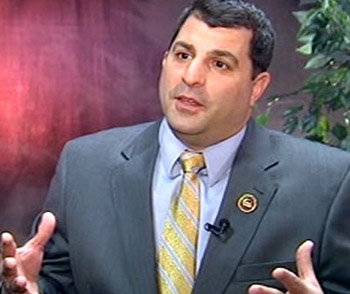THE PEDOPHILIA CRISIS
Cases of sexual abuse by priests continue to surface almost
everywhere. As a rule, a boy who is abused remains silent. Only later,
when he becomes a man, does he have the courage and means to denounce
the crime committed against him. So, to help this type of victim bring
the criminal to justice, it is essential that the latter should not be
protected by a short-term statute of limitations.
For example, if the law in an American State establishes a five year limit to bring a lawsuit for a sexual crime, it implies that a boy abused at age 9 would have to take his abuser to court before he is 14-years-old. Anyone can see that, most likely, during this time the boy will not speak out and the criminal will escape the reach of justice.
Thus, in principle, the longer the statute of limitations, the better the protection of the victim and the more intimidating it is for anyone to commit this type of crime.

PA Rep. Mark Rozzi, above, a victim of sexual abuse by a priest, proposed the bill to extend the time for a victim to file a lawsuit; his bill was defeated in the State Senate pressured by Arch. Chaput, below

The bill was killed in the State Senate in June. Among the determining factors for its rejection was the strong pressure coming from the Catholic Bishops. (cf. National Catholic Reporter, July 1, 2016, p. 12)
Last June the Pennsylvania State Assembly approved (180 pro, 15 con) a bill extending the present day age limit of past victims to file civil lawsuits from age 30 to 50. With this measure, the criminals would be accountable for their crimes almost any time the victims would decide to accuse them. The advocates of the bill intended it to provide past victims of sexual abuse more time to file civil lawsuits against their abuser-priests and the Bishops who did not duly punish them.
The State Senate approved the bill but without the retroactive provision long sought by the victims’ advocates. In other words, from now on more time will be given to victims of new sexual abuses to seek justice, but not for those who were abused in the past. Among the factors that blocked this application to past cases was the strong pressure of the Catholic Bishops. (cf. ibid.)
Although admitting and apologizing for the crimes of pedophilia by priests, the representatives of the Catholic Church in the United States are adopting an extremely aggressive position against new laws and lawsuits: a money-minded policy to allegedly protect their dioceses.
The two sides of this dispute
On one hand, the Bishops argue that the victims are demanding such high compensation that the dioceses cannot bear the costs and are obliged to file for bankruptcy. Indeed, many in fact have already filed for it, the most recent being the Diocese of Gallup on June 23. (cf. National Catholic Reporter, July 15, 2016, p. 12)

American Bishops pretend to be holy, but do not enforce Catholic Morals in the semninaries & clergy
On the other hand, many victims also are not seeking moral reparation, but are taking advantage of the pedophilia crisis to get money. If I recall well, in photos of victims commemorating their victories with their attorneys after attaining favorable verdicts or exorbitantly high out-of-court agreements, they were exultant not because they brought the criminal to a just punishment or because they received moral reparation, but because they got their hands on a lot of money.
This month, the chairwoman of a Scottish Government Inquiry into child abuse – Susan O’Brien – was obliged to resign after she reported the reaction of one of the abused victims she had encountered. The victim told her that a childhood instance of sex abuse “was the best thing that ever happened [to him]” (cf. The Tablet, July 9, 2016, p. 29). Why was that? Because, in the present-day context of the pedophilia crisis, the victim has the chance to make a lot of money.
We see, therefore, that both sides – the Bishops and many of the victims – are not much concerned about morals and justice. The Bishops keep saying: “We are very sorry”; the victims keep saying: “We are very damaged,” but deep down both are using the abuse as a façade to save or to make money. It is, mostly, hypocritical positions assumed by both parties.
Why this money-minded atmosphere?
I consider that this money-minded priority of the American Bishops and, consequently, of the American victims was caused substantially by the rotten past of Card. Roger Mahony.
I live in Los Angeles and I remember following carefully the ensemble of lawsuits against this Archdiocese. More than 500 victims filed cases against it – based on very credible grounds. Card. Roger Mahony, at the time the head of this very wealthy Archdiocese, considered it better for his reputation to settle the cases out-of-court for the amount of $660 million.
Shortly before, Bishop Todd Brown of Orange County had made a similar agreement, paying out $100 million for 90 cases. Mahony’ agreement was followed by that of Bishop Robert Brom of San Diego – $198 million for 140 cases – and one by Archbishop Allen Vigneron of Oakland - $56.4 million for 56 cases.

Mahony's corruption: the ultimate cause of the bankruptcies of Catholic Dioceses
- They knew that their dioceses were morally rotten, undermined by pedophile priests whom they had dishonestly protected for decades;
- They had the example of Card. Bernard Law of Boston, who went to court and ended by being removed from the Boston Archdiocese by a universal demand of the public, Catholics and even its priests.
- To be a victim of clerical sexual abuse became an enormously profitable source of income for both lawyers and victims; consequently, the concern for justice and the punishment of the criminal was obfuscated by greed.
- The other American Dioceses had to either follow the same pattern or file for bankruptcy.
This is the backdrop for the discussions we are seeing today in State assemblies around the U.S. and the pressure being exerted by the Catholic Bishops against the lawmakers.
When the Bishops try to claim that a conspiracy of the State against the Church is what inspires these laws favorable to victims, they are hiding that the real cause of the problem: their own lack of morality.
Since I am not money-minded, I believe that the victims should be allowed to continue to prosecute the corrupted priests who abused them and the Bishops who covered them up until justice is achieved. Not because of money, but because these priests are a combination of traitor, coward and cruel criminal and the Bishops are their accomplices.
Then, after due punishment is meted out to her guilty representatives, I hope that the Catholic Church will again shine in her adamantine purity, justice and honor.
